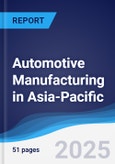Key Highlights
- The automotive manufacturing industry is segmented into car manufacturing, motorcycle manufacturing, and truck manufacturing. The electric and hybrid vehicles are out of our market scope.
- The Asia-Pacific automotive manufacturing industry recorded revenues of $997.8 billion in 2024, representing a compound annual growth rate (CAGR) of 1.2% between 2019 and 2024.
- Industry production volume increased with a CAGR of 1.7% between 2019 and 2024, reaching a total of 117.0 million units in 2024.
- The Asia-Pacific automotive manufacturing industry’s production volume grew by 2.9% in 2024, which was also supported by rising demand from the domestic rental car market. Fleet expansion by rental companies led to bulk orders, boosting factory output. According to the publisher, the rental car fleet in China stood at 198,509 units in 2024, an increase of 21.6% from the previous year.
Scope
- Save time carrying out entry-level research by identifying the size, growth, major segments, and leading players in the automotive manufacturing market in Asia-Pacific
- Use the Five Forces analysis to determine the competitive intensity and therefore attractiveness of the automotive manufacturing market in Asia-Pacific
- Leading company profiles reveal details of key automotive manufacturing market players’ global operations and financial performance
- Add weight to presentations and pitches by understanding the future growth prospects of the Asia-Pacific automotive manufacturing market with five year forecasts
Reasons to Buy
- What was the size of the Asia-Pacific automotive manufacturing market by value in 2024?
- What will be the size of the Asia-Pacific automotive manufacturing market in 2029?
- What factors are affecting the strength of competition in the Asia-Pacific automotive manufacturing market?
- How has the market performed over the last five years?
- What are the main segments that make up Asia-Pacific's automotive manufacturing market?
Table of Contents
Companies Mentioned (Partial List)
A selection of companies mentioned in this report includes, but is not limited to:
- Toyota Motor Corp
- Honda Motor Co Ltd
- Hyundai Motor Co
- SAIC Motor Corp Ltd








